 W
WCrimes against humanity are certain acts that are purposely committed as part of a widespread or systematic attack, directed against any civilians, in time of war or peace. The first prosecution for crimes against humanity took place at the Nuremberg trials. Initially being considered for legal use, widely in International Law, following the Armenian Genocide.
 W
WThe 2019 Venezuelan Amnesty Law is a law promulgated by the National Assembly of Venezuela that was created to gave amnesty to civilians, military and other officials identified as prisoners, persecuted and political exiles for acts committed from 1 January 1999 until the promulgation of the law, and that included political acts such as rebellion and sedition. Its objective was to eliminate some legal effects that could endanger the consolidation of a new government during the 2019 Venezuelan presidential crisis.
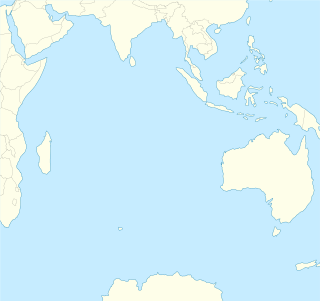 W
WThe deportation of Chagossians from the Chagos Archipelago was the forced expulsion of the inhabitants of the island of Diego Garcia and the other islands of the British Indian Ocean Territory (BIOT) by the United Kingdom, at the request of the United States, beginning in 1968 and concluding on 27 April 1973 with the evacuation of Peros Banhos atoll. The people, known at the time as the Ilois, are today known as Chagos Islanders or Chagossians.
 W
WThe Deportation of the Balkars was the expulsion by the Soviet government of the entire Balkar population of the North Caucasus to Central Asia on March 8, 1944, during World War II. The expulsion was ordered by NKVD chief Lavrentiy Beria after approval by Soviet Premier Joseph Stalin. All the 37,713 Balkars of the Caucasus were deported from their homeland in one day. The crime was a part of a Soviet forced settlement program and population transfer that affected several million members of non-Russian Soviet ethnic minorities between the 1930s and the 1950s. Officially the deportation was a response to the Balkars' supposed collaboration with occupying German forces. Later, in 1989, the Soviet government declared the deportation illegal.
 W
WThe Deportation of the Chechens and Ingush, also known as Aardakh, Operation Lentil ; Ingush and Chechen: Вайнах махкахбахар Vaynah Mahkahbahar) was the Soviet forced transfer of the whole of the Vainakh populations of the North Caucasus to Central Asia on February 23, 1944, during World War II. The expulsion was ordered by NKVD chief Lavrentiy Beria after approval by Soviet Premier Joseph Stalin, as a part of a Soviet forced settlement program and population transfer that affected several million members of non-Russian Soviet ethnic minorities between the 1930s and the 1950s.
 W
WThe deportation of the Crimean Tatars or the Sürgünlik ("exile") was the ethnic cleansing and cultural genocide of at least 191,044 Crimean Tatars in 18–20 May 1944 carried out by the Soviet government, ordered by Lavrentiy Beria, head of the Soviet state security and secret police, acting on behalf of Joseph Stalin. Within three days, the NKVD used cattle trains to deport mostly women, children, the elderly, even Communists and members of the Red Army, to mostly the Uzbek SSR, several thousand kilometres away. They were one of the several ethnicities who were encompassed by Stalin's policy of population transfer in the Soviet Union.
 W
WThe Kalmyk deportations of 1943, codename Operation Ulusy was the Soviet deportation of more than 93,000 people of Kalmyk nationality, and non-Kalmyk women with Kalmyk husbands, on 28–31 December 1943. Families and individuals were forcibly relocated in cattle wagons to special settlements for forced labor in Siberia. Kalmyk women married to non-Kalmyk men were exempted from the deportations. The government's official reason for the deportation was an accusation of Axis collaboration during World War II based on the approximately 5,000 Kalmyks who fought in the Nazi-affiliated Kalmykian Cavalry Corps. The government refused to acknowledge that more than 23,000 Kalmyks served in the Red Army and fought against Axis forces at the same time.
 W
WThe Deportation of the Karachays, codenamed Operation Seagull, was the forced transfer by the Soviet government of the entire Karachay population of the North Caucasus to Central Asia in November 1943, during World War II. The expulsion was ordered by NKVD chief Lavrentiy Beria after approval by Soviet Premier Joseph Stalin. Nearly 70,000 Karachays of the Caucasus were deported from their native land. The crime was a part of a Soviet forced settlement program and population transfer that affected several million members of non-Russian Soviet ethnic minorities between the 1930s and the 1950s.
 W
WThe Deportation of the Meskhetian Turks was the forced transfer by the Soviet government of the entire Meskhetian Turk population from the Meskheti region of the Georgian Soviet Socialist Republic to Central Asia on 14 November 1944. During the deportation, between 92,307 and 94,955 Meskhetian Turks were forcibly removed from 212 villages. They were packed into cattle wagons and mostly sent to the Uzbek Soviet Socialist Republic. Members of other ethnic groups were also deported during the operation, including Kurds and Hemshils, bringing the total to approximately 115,000 evicted people. They were placed in special settlements where they were assigned to forced labor. The deportation and harsh conditions in exile caused between 12,589 and 14,895 deaths, at a minimum.
 W
WThe Doboj ethnic cleansing refers to war crimes, including murder, wanton destruction, ethnic cleansing and persecution committed against Bosniaks and Croats in the Doboj area by the Yugoslav People's Army and Serb paramilitary units from May until September 1992 during the Bosnian war. On 26 September 1997, Serb soldier Nikola Jorgić was found guilty by the Düsseldorf Oberlandesgericht on 11 counts of genocide involving the murder of 30 persons in the Doboj region, making it the first Bosnian Genocide prosecution. The International Criminal Tribunal for the former Yugoslavia (ICTY) classified it as a crime against humanity and sentenced five Serb officials.
 W
WThe Siege of Eastern Ghouta was a siege that was laid by Syrian Government forces in April 2013, to the area in eastern Ghouta held by anti-government forces since November 2012, during the Syrian Civil War. The cities and villages under siege were Douma, Mesraba, Arbin, Hamouria, Saqba, Modira, Eftreis, Jisrin, as well as suburbs of Damascus Beit Sawa, Harasta, Zamalka, Ein Tarma, Hazeh and Kafr Batna. By 2016, around 400,000 people were trapped in an area just over 100 square kilometres in size, thus with a population density around 4,000 inhabitants/km2.
 W
WEstimates of the number of deaths attributable to the Soviet dictator Joseph Stalin vary widely. Some scholars assert that record-keeping of the executions of political prisoners and ethnic minorities are neither reliable nor complete while others contend that archival materials declassified in 1991 contain irrefutable data far superior to sources used prior to 1991 such as statements from emigres and other informants.
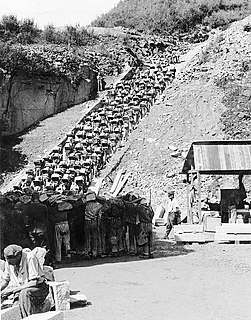 W
WExtermination through labour was the practice in concentration camps in Nazi Germany of killing prisoners by means of forced labour. As part of the Holocaust, forced labour served a dual purpose: providing useful work to the Nazis, and killing prisoners who would otherwise have to be killed by other methods. It was a cruel twist of the phrase Arbeit macht frei "Work sets you free", which was emblazoned on the gates of multiple concentration camps. The work was designed to be absolutely destroying. Concentration camp inmates worked up to 12 hours a day with very little food, clothing, or medical care; the average labourer died after 4 months.
 W
WA forced disappearance occurs when a person is secretly abducted or imprisoned by a state or political organization, or by a third party with the authorization, support, or acquiescence of a state or political organization, followed by a refusal to acknowledge the person's fate and whereabouts, with the intent of placing the victim outside the protection of the law.
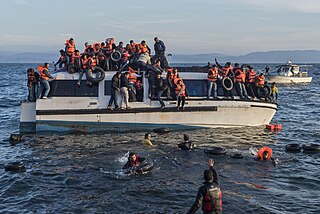 W
WForced displacement is the involuntary or coerced movement of a person or people away from their home or home region. This movement may have been caused by a variety of factors including natural disasters, violence, ethnic cleansing, individual or group persecution, droughts, civil wars, deportation and population transfer. The UNHCR defines 'forced displacement' more narrowly as: displaced "as a result of persecution, conflict, generalized violence or human rights violations".
 W
WManuel Fraga Iribarne was a Spanish professor and politician in Francoist Spain, who was also the founder of the People's Party. Fraga was Minister of Information and Tourism between 1962 and 1969, Ambassador to the United Kingdom between 1973 and 1975, Minister of the Interior in 1975, Second Deputy Prime Minister between 1975 and 1976, President of the People's Alliance/People's Party between 1979 and 1990 and President of the Regional Government of Galicia between 1990 and 2005. He was also a Member of the Congress of Deputies and a Senator.
 W
WThe Great Leap Forward of the People's Republic of China (PRC) was an economic and social campaign led by the Chinese Communist Party (CCP) from 1958 to 1962. Chairman Mao Zedong launched the campaign to reconstruct the country from an agrarian economy into a communist society through the formation of people's communes. Mao decreed increased efforts to multiply grain yields and bring industry to the countryside. Local officials were fearful of Anti-Rightist Campaigns and competed to fulfill or over-fulfill quotas based on Mao's exaggerated claims, collecting "surpluses" that in fact did not exist and leaving farmers to starve. Higher officials did not dare to report the economic disaster caused by these policies, and national officials, blaming bad weather for the decline in food output, took little or no action. The Great Leap resulted in tens of millions of deaths, with estimates ranging between 18 million and 45 million deaths, making the Great Chinese Famine the largest in human history.
 W
WThe trafficking of persons is the fastest growing and most profitable criminal activity after drug and arms trafficking. According to the United Nations Protocol to Prevent, Suppress and Punish Trafficking in Persons, Especially Women and Children, human trafficking is defined as follows: “Trafficking in persons shall mean the recruitment, transportation, transfer, harboring or receipt of persons, by means of the threat or use of force or other forms of coercion, of abduction, of fraud, of deception, of the abuse of power or of a position of vulnerability or of the giving or receiving of payments or benefits to achieve the consent of a person having control over another person, for the purpose of exploitation. Exploitation shall include, at a minimum, the exploitation of the prostitution of others or other forms of sexual exploitation, forced labor or services, slavery or practices similar to slavery, servitude or the removal of organs.”
 W
WThe International Military Tribunal for the Far East (IMTFE), also known as the Tokyo Trial or the Tokyo War Crimes Tribunal, was a military trial convened on April 29, 1946, to try the leaders of the Empire of Japan for joint conspiracy to start and wage war, conventional war crimes and crimes against humanity.
 W
WThe Laghman massacre was a war crime perpetrated by the Red Army in April 1985 in the villages of Kas-Aziz-Khan, Charbagh, Bala Bagh, Sabzabad, Mamdrawer, Haider Khan and Pul-i-Joghi in the Laghman Province, during the Soviet-Afghan War. Between 500 and 1,000 civilians were murdered in was what described as Soviet reprisals against civilians for anti-communist resistance members and their military actions aimed against the Red Army. The Soviet troops arrived with 200 tanks and armored personnel carriers on 11 March 1985 in the said villages in search for the Mujahideen, rejecting an offer from the Democratic Republic of Afghanistan to send their own troops to reduce the number of fatalities. According to the reports from Laghman, children were disfigured by the soldiers, while a hung baby was stabbed by a bayonet on a tree, and later its parents were killed.
 W
WThe 1987 Lieyu massacre, also known as the March 7 Incident, Donggang Incident or Donggang Massacre, occurred on 7 March 1987 at Donggang Bay, Lieyu Island, Kinmen, Fujian, Republic of China. According to the diary of Superior-general Hau Pei-tsun, nineteen unarmed Vietnamese boat people were killed by the ROC military. There may have been more than nineteen deaths.
 W
WMaratha, Santalaris and Aloda massacre refers to the massacre of Turkish Cypriots by EOKA B on 14 August 1974 during the Turkish invasion of Cyprus in the villages of Maratha, Santalaris and Aloda. 89 people from Maratha and Santalaris were killed, and a further 37 people were killed in the village of Aloda. In total, 126 people were killed during the massacre. The massacre occurred shortly after the start of the second Turkish invasion, concurring with other massacres.
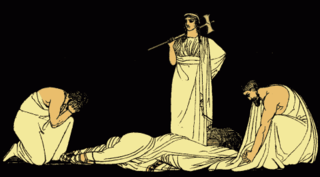 W
WMurder is the unlawful killing of another human without justification or valid excuse, especially the unlawful killing of another human with malice aforethought. This state of mind may, depending upon the jurisdiction, distinguish murder from other forms of unlawful homicide, such as manslaughter. Manslaughter is killing committed in the absence of malice, brought about by reasonable provocation, or diminished capacity. Involuntary manslaughter, where it is recognized, is a killing that lacks all but the most attenuated guilty intent, recklessness.
 W
WNacht und Nebel, meaning Night and Fog, was a directive issued by Adolf Hitler on 7 December 1941 targeting political activists and resistance "helpers" in World War II, who were to be imprisoned, killed, or made to disappear, while the family and the population remained uncertain as to the fate or whereabouts of the Nazi state's alleged offender. Victims who disappeared in these clandestine actions were never heard from again.
 W
WThe Nanjing War Crimes Tribunal was established in 1946 by the government of Chiang Kai-shek to judge four Japanese Imperial Army officers accused of crimes committed during the Second Sino-Japanese War. It was one of ten tribunals established by the Nationalist government.
 W
WThe Nuremberg trials were a series of military tribunals held after World War II by the Allied forces under international law and the laws of war. The trials were most notable for the prosecution of prominent members of the political, military, judicial, and economic leadership of Nazi Germany, who planned, carried out, or otherwise participated in the Holocaust and other war crimes. The trials were held in Nuremberg, Germany, and their decisions marked a turning point between classical and contemporary international law.
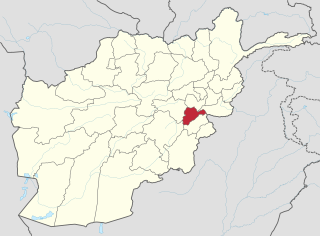 W
WThe Padkhwab-e Shana massacre or Pad Khwab-e Shanah massacre was a war crime perpetrated by the Red Army on 13 September 1982 in the village of Padkhwab-e Shana in the Logar Province, Afghanistan, during the Soviet–Afghan War. The people were murdered in what was described as Soviet reprisals against civilians for anti-communist resistance members and their military actions aimed against the Red Army. When a Red Army unit entered the village to search for resistance members, several villagers hid under an irrigation canal. The Russian commander told the elders to bring out all the people in the tunnel, but the elders said there is nobody there. When one man emerged from the stairway, contradicting the elders, the Russian commander ordered that all the people under ground come out. When the people below refused, they were killed by being burned alive in an explosion caused through a mix of gasoline, pentrite and trinitrotoluene, thrown into the canal to rout them out. The people in the canal were either hiding to avoid military drafting or were afraid of Soviet attacks. According to the reports, 11 villagers were forced to look at the murders by the Red Army.
 W
WThe Paris massacre of 1961 occurred on 17 October 1961, during the Algerian War (1954–62). Under orders from the head of the Parisian police, Maurice Papon, the French National Police attacked a demonstration by 30,000 pro-National Liberation Front (FLN) Algerians. After 37 years of denial and censorship of the press, in 1998 the French government finally acknowledged 40 deaths, although there are estimates of 100 to 300 victims. Death was due to heavy-handed beating by the police, as well as mass drownings, as police officers threw demonstrators in the river Seine.
 W
WFollowing the beginning of the Yugoslav wars, especially the War in Croatia in 1991, members of Serbian Radical Party and Serbian Chetnik Movement have conducted a campaign of intimidation and persecution of Croats of Serbia in Vojvodina, Serbia, through hate speech. These acts forced a part of the local Croat population to leave the area in 1992. Most of them were resettled in Croatia. The affected locations included Hrtkovci, Nikinci, Novi Slankamen, Ruma, Šid, and other places bordering Croatia. According to some estimates, around 10,000 Croats left Vojvodina under political pressure in three months of 1992, and a total of 20,000 fled by the end of the year.
 W
WPitești Prison was a penal facility in Pitești, Romania, best remembered for the reeducation experiment which was carried out between December 1949 and September 1951, during Communist party rule. The experiment, which was implemented by a group of prisoners under the guidance of the prison administration, was designed as an attempt to violently "reeducate" the mostly young political prisoners, who were primarily supporters of the fascist Iron Guard, as well as Zionist members of the Romanian Jewish community. The Romanian People's Republic adhered to a doctrine of state atheism and the inmates who were held at Pitești Prison included religious believers, such as Christian seminarians. The experiment's goal was for prisoners to discard past political and religious convictions, and, eventually, to alter their personalities to the point of absolute obedience. Estimates for the total number of people who passed through the experiment range from up to 1,000 to 5,000.
 W
WPopulation transfer in the Soviet Union was the forced transfer of various groups from the 1930s up to the 1950s ordered by Joseph Stalin. It may be classified into the following broad categories: deportations of "anti-Soviet" categories of population, deportations of entire nationalities, labor force transfer, and organized migrations in opposite directions to fill the ethnically cleansed territories. Dekulakization marked the first time that an entire class was deported, whereas the deportation of the Soviet Koreans in 1937 marked the first instance of an ethnic deportation of an entire nationality.
 W
WDuring the Bosnian War, there was an ethnic cleansing campaign committed by the Bosnian Serb political and military leadership - Army of the Republika Srpska, mostly against Bosniak and Croat civilians in the Prijedor region of Bosnia and Herzegovina in 1992 and 1993. The composition of non-Serbs was drastically reduced: out of a population of 50,000 Bosniaks and 6,000 Croats, only some 6,000 Bosniaks and 3,000 Croats remained in the municipality by the end of the war. After the Srebrenica massacre, Prijedor is the area with the second highest rate of civilian killings committed during the Bosnian War. According to the Sarajevo-based Research and Documentation Center (IDC), 4,868 people were killed or went missing in the Prijedor municipality during the war. Among them were 3,515 Bosniak civilians, 186 Croat civilians and 78 Serb civilians. As of October 2013, 96 mass graves have been located and around 2,100 victims have been identified, largely by DNA analysis.
 W
WThe Przyszowice massacre was a massacre perpetrated by the Red Army against civilian inhabitants of the Polish village of Przyszowice in Upper Silesia during the period January 26 to January 28, 1945. Sources vary on the number of victims, which range from 54 to over 60 – and possibly as many as 69. The Institute of National Remembrance, a Polish organization that carried out research into these events, has declared that the Przyszowice massacre was a crime against humanity.
 W
WThe Report of the Commission of Inquiry on Human Rights in the Democratic People's Republic of Korea is the landmark document resulting from the investigations on human rights in North Korea commissioned by the United Nations Human Rights Council in 2013 and concluded in 2014.
 W
WThe Rome Statute of the International Criminal Court is the treaty that established the International Criminal Court (ICC). It was adopted at a diplomatic conference in Rome, Italy on 17 July 1998 and it entered into force on 1 July 2002. As of November 2019, 123 states are party to the statute. Among other things, the statute establishes the court's functions, jurisdiction and structure.
 W
WThe Sack of Magdeburg, also called Magdeburg's Wedding or Magdeburg's Sacrifice, was the destruction of the Protestant city of Magdeburg on 20 May 1631 by the Imperial Army and the forces of the Catholic League, resulting in the deaths of around 20,000, including both defenders and non-combatants. The event is considered the worst massacre of the Thirty Years' War. Magdeburg, then one of the largest cities in Germany, having well over 25,000 inhabitants in 1630, did not recover its importance until well into the 18th century.
 W
WSexual slavery and sexual exploitation is attaching the right of ownership over one or more people with the intent of coercing or otherwise forcing them to engage in sexual activities. This includes forced labor, reducing a person to a servile status and sex trafficking persons, such as the sexual trafficking of children.
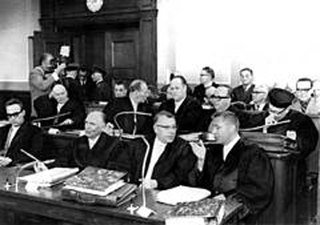 W
WThe Sobibor trial was a 1965–66 judicial trial in the West German prosecution of SS officers who had worked at Sobibor extermination camp; it was held in Hagen. It was one of a series of similar war crime trials held during the early and mid-1960s, such as the 1961 trial of Adolf Eichmann by Israel in Jerusalem, and the Frankfurt Auschwitz Trials of 1963–65, also held in West Germany. These trials heightened general public and international understanding of the extent of the crimes that had been perpetrated in occupied Poland some twenty years earlier by Nazi bureaucrats and persons acting as their executioners.
 W
WThe Soviet deportations from Bessarabia and Northern Bukovina took place between late 1940 and 1951 and were part of Joseph Stalin's policy of political repression of the potential opposition to the Soviet power. The deported were typically moved to so-called "special settlements" (спецпоселения).
 W
WThe war crimes which were perpetrated by the Soviet Union and its armed forces from 1919 to 1991 include acts which were committed by the Red Army as well as acts which were committed by the NKVD, including acts which were committed by the NKVD's Internal Troops. In some cases, these acts were committed upon the orders of the Soviet leader Joseph Stalin in pursuance of the early Soviet Government's policy of Red Terror. In other instances they were committed without orders by Soviet troops against prisoners of war or civilians of countries that had been in armed conflict with the USSR, or they were committed during partisan warfare.
 W
WHuman trafficking is the trade of humans for the purpose of forced labour, sexual slavery, or commercial sexual exploitation for the trafficker or others. This may encompass providing a spouse in the context of forced marriage, or the extraction of organs or tissues, including for surrogacy and ova removal. Human trafficking can occur within a country or trans-nationally. Human trafficking is a crime against the person because of the violation of the victim's rights of movement through coercion and because of their commercial exploitation. Human trafficking is the trade in people, especially women and children, and does not necessarily involve the movement of the person from one place to another.
 W
WThe tragedy of the Guerry's wells designates the massacre of 36 Jews during the summer 1944 in Savigny-en-Septaine in France. It is located at 47°02′07″N 02°31′26″E.
 W
WThe two Treblinka trials concerning the Treblinka extermination camp personnel began in 1964. Held at Düsseldorf in West Germany, they were the two judicial trials in a series of similar war crime trials held during the early 1960s, such as the Jerusalem Adolf Eichmann trial (1961) and the Frankfurt Auschwitz Trials (1963–65), as a result of which the general public came to realize the extent of the crimes that some two decades earlier had been perpetrated in occupied Poland by Nazi bureaucrats and their willing executioners. In the subsequent years, separate trials dealt with personnel of the Bełżec (1963–65), Sobibor (1966), and Majdanek (1975–81) extermination camps.
 W
W